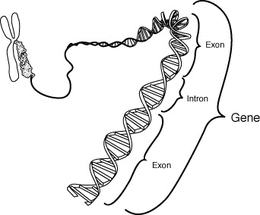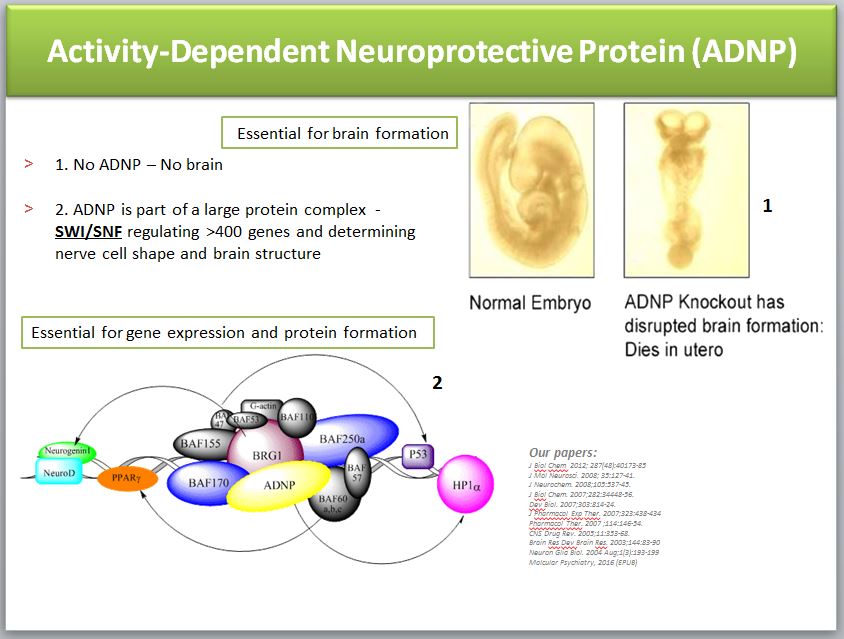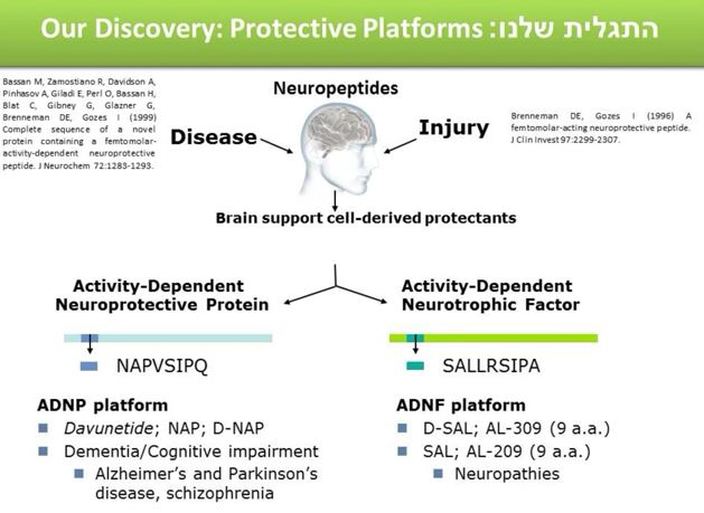
The ADNP Gene
The ADNP gene is one of the most important genes in the human body. It is essential for brain development and it regulates/controls over 400 other genes for brain formation and organ development.
ADNP stands for Activity-Dependent Neuroprotective Protein and is a gene discovered at the laboratory of Professor Illana Gozes at Tel Aviv University. It is a gene coding for a protein that provides protection for nerve cells against electrical blockade ( = protection against inability of nerve cells to communicate electrically). In our kids, the normally 'protective' gene is mutated/changed and is not functioning properly in our children with this mutation.
The Gozes Laboratory discovered that ADNP is crucial for brain formation and complete ADNP gene deficiency in mice results in inability to form a brain. During embryonic development, ADNP regulates over 400 other genes crucial for brain formation and organ development. Among the genes regulated by ADNP are also muscle genes, meaning that not only the brain is affected by ADNP, but also muscles which may lead to heart and motor defects. Other systems are affected as well, including the immune system.
OMIM additionally describes:
Gene Function
Zamostiano et al. (2001) found that downregulation of ADNP by antisense oligonucleotides upregulated p53 (TP53; 191170) and reduced the viability of intestinal cancer cells by 90%. They proposed that ADNP is involved in maintaining cell survival, possibly by modulating p53.
Gene Structure
Zamostiano et al. (2001) determined that the ADNP gene contains 5 exons and spans 40.6 kb. The last 3 exons are translated (Helsmoortel et al., 2014).
Mapping
Using FISH, Zamostiano et al. (2001) mapped the ADNP gene to chromosome 20q12-q13.2, a region frequently amplified in neoplasias and associated with aggressive tumor growth.
The ADNP gene is one of the most important genes in the human body. It is essential for brain development and it regulates/controls over 400 other genes for brain formation and organ development.
ADNP stands for Activity-Dependent Neuroprotective Protein and is a gene discovered at the laboratory of Professor Illana Gozes at Tel Aviv University. It is a gene coding for a protein that provides protection for nerve cells against electrical blockade ( = protection against inability of nerve cells to communicate electrically). In our kids, the normally 'protective' gene is mutated/changed and is not functioning properly in our children with this mutation.
The Gozes Laboratory discovered that ADNP is crucial for brain formation and complete ADNP gene deficiency in mice results in inability to form a brain. During embryonic development, ADNP regulates over 400 other genes crucial for brain formation and organ development. Among the genes regulated by ADNP are also muscle genes, meaning that not only the brain is affected by ADNP, but also muscles which may lead to heart and motor defects. Other systems are affected as well, including the immune system.
OMIM additionally describes:
Gene Function
Zamostiano et al. (2001) found that downregulation of ADNP by antisense oligonucleotides upregulated p53 (TP53; 191170) and reduced the viability of intestinal cancer cells by 90%. They proposed that ADNP is involved in maintaining cell survival, possibly by modulating p53.
Gene Structure
Zamostiano et al. (2001) determined that the ADNP gene contains 5 exons and spans 40.6 kb. The last 3 exons are translated (Helsmoortel et al., 2014).
Mapping
Using FISH, Zamostiano et al. (2001) mapped the ADNP gene to chromosome 20q12-q13.2, a region frequently amplified in neoplasias and associated with aggressive tumor growth.



